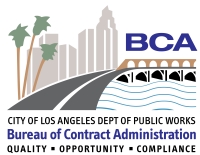WHAT IS LABOR COMPLIANCE?
The Department of Public Works (DPW) Bureau of Contract Administration's (BCA) Office of Contract Compliance (OCC) administers the City of Los Angeles' Labor Compliance Program (LCP). The City's LCP is certified under California Code of Regulations Chapter 8, Section 16425 and adheres to the statutory requirements as stated in California's Labor Code Section 1771.5.
The OCC's Labor Compliance Section (LSC) is responsible for educating, assisting, monitoring and enforcing prevailing wage requirements of the applicable labor laws to ensure that all contractors working on City projects are in compliance with State (California Labor Code Chapter 1 of Part 7 of Division 2) and Federal (Code of Federal Regulations 29) prevailing wage statutes and regulations.
Aside from the DPW projects, the LCS also monitors projects for the following City Departments:
- Recreation and Parks
- Harbor Department
- Los Angeles World Airports
- General Services
- Library Department
- Convention Center
- Police
- Fire Department
- LA Zoo
PROGRAM OBJECTIVE
The objective of the LCS is to administer the City's LCP in accordance with all Federal, State and City requirements to ensure that all contractors and workers employed on Public Works projects are treated equitably, fairly, and compensated in conformity with the Federal and/or States prevailing wage rates.
GOALS OF THE LABOR COMPLIANCE PROGRAM
The LCS monitors and enforces the proper reporting of prevailing wages, fringe benefits, apprenticeship utilization, and the resolution of worker wage violations. Major activities performed include: (i) Approving language relating to wage and hour requirement contained in bid specifications and proposals; (ii) Educating, assisting, and directing contractors in regards to labor and prevailing wage requirements; (iii) Analyzing certified payroll (CPR) documents; (iv) Conducting and processing on-site worker interviews; (v) Investigating wage and hour complaints; (vi) Conducting audits of source documents; (vii) Recommending, collecting, and distributing wage restitutions and penalty fees; (viii) Preparing and presenting evidence in support of the withholding or progress and retention payments due to the prime contractor before administrative hearing officers; and (ix) Processing and approving construction project Board Acceptance Reports.
The paramount goal of the LCS is to protect the rights and interests of all parties involved in public works contracting.
Employees are protected from exploitation and underpayment.
Contractors are protected from false employee accusations.
Contractors are protected from unfair contractors who would gain advantage by underpaying their own workers.
Public interest is protected by ensuring that the quality of work will not be negatively affected because a contractor hires unqualified workers and pays them less than the prevailing wage rates.
PREVAILING WAGE REQUIREMENTS IN CITY PUBLIC WORKS PROJECTS
The requirement to pay prevailing wage rates on public works projects is found in Volume I, Article III, Section 377 of the City Charter.
APPRENTICESHIP UTILIZATION REQUIREMENTS
In accordance with California Labor Code Section 1777.5(d), a contractor (including any subcontractor of any tier) who is awarded a City contract, and who employs workers in an apprenticeable craft or trade, shall employ apprentices in at least the ratios as stipulated in said Labor Code Section.
LABOR COMPLIANCE AUTHORITY
The legal basis for OCC is contained in Division 10, Sections 10.7 and 10.7.1 of the City's Administrative Code which states (in part) "…In enforcing this requirement, the Office of Contract Compliance will monitor, inspect, and investigate to insure that the contractor is acting in compliance with the prevailing wage requirements of such City contracts. Each awarding authority shall cooperate to the fullest extent with the Office of Contract Compliance in their enforcement activities."
POWERS AND DUTIES
Division 22, Chapter 13, Article 10, Section 22.359.1 Powers and Duties states (in part), "The Office of Contract Compliance shall have the following powers and duties:
To investigate prevailing wage violations and enforce compliance of City, State and Federal laws;"
USEFUL LINKS
- DPW Bureau of Contract Administration - https://bca.lacity.gov
- California Department Of Industrial Relations - https://www.dir.ca.gov
- California Division of Apprenticeship Standards - https://www.dir.ca.gov/DAS
- Federal Department of Labor - https://www.dol.gov
